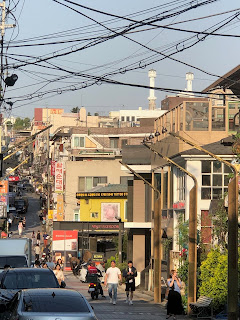Women's Lives: Work, Family, Chlldren

Women’s lives and possible choices have changed dramatically in the past two generations. One of the statistics related to those changes which has been getting attention and worry is the low fertility rate of Korean women: only 0.96, less than even one baby per women. Yet most population experts say a fertility rate of 2.1 is needed to keep a population stable (with other things like war and immigration also playing their parts). Korean fertility rates reflect common trends in societies which are being more urban and educated. Traditional agricultural societies have had higher infant mortality rates and so more births were “needed,” and birth control techniques were often ineffective. Women usually married in their teens and might have children until menopause. Women often run the small shops Today in Korea women are usually well-educated, and usually working outside the home for pay. After ...





